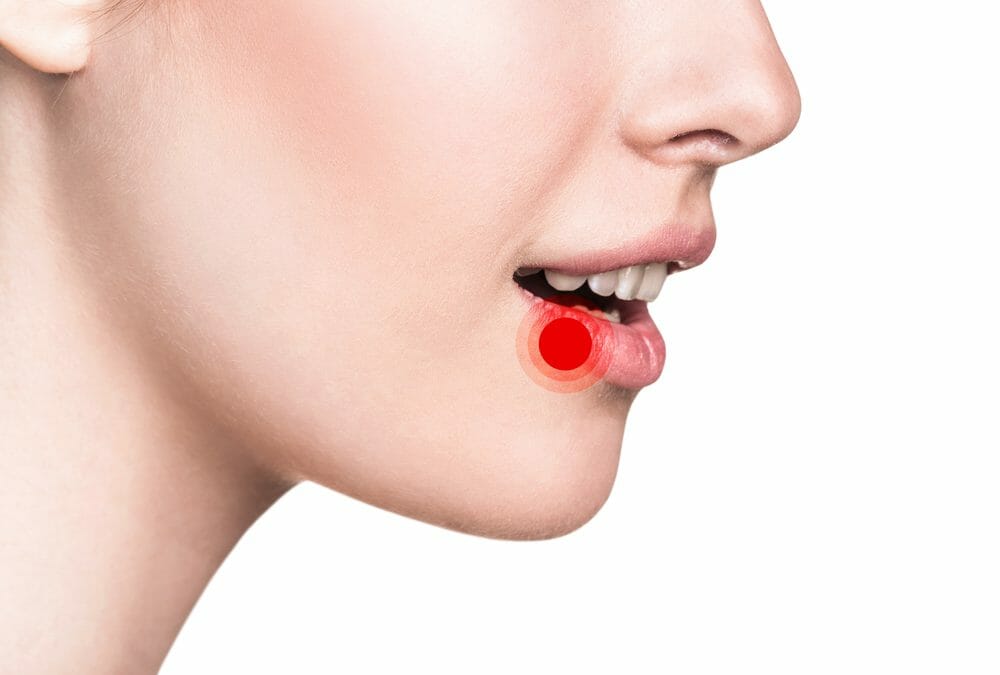Although both cold sores and canker sores affect the mouth and can be quite painful, their similarities pretty much stop there. Cold sores and canker sores are quite different oral health problems with different causes, symptoms, and treatments.
Continue reading to learn how to distinguish a cold sore from a canker sore and what makes the two oral health problems so different from each other.
What’s the Difference Between Cold Sores and Canker Sores?
Cold Sores
What Causes Cold Sores?
Cold sores are a symptom of the herpes simplex virus (HSV). The two strains that most commonly cause cold sores are HSV-1 and HSV-2.
Both are highly contagious and can be transmitted when one person is exposed to the virus from another person’s sore. This can occur as a result of sharing eating utensils, toothbrushes, drinking glasses, kissing, and more.
Once infected with HSV, factors like stress, fatigue, having a cold or influenza, hormonal changes, sun exposure, and irritation to the skin around the mouth can all trigger an outbreak with a cold sore.
Cold Sore Location
Unless a cold sore is caused by a new infection in a child, the sores almost always develop on the outside of the mouth on or around a person’s lips.
New infections in young children can sometimes result in sores that appear on the inside of the mouth. As a result, these infections are sometimes mistakenly diagnosed as canker sores.
Cold Sore Symptoms
Cold sore symptoms can vary depending on whether the viral infection is old or new.
Symptoms of recent infection with HSV include:
- Tingling or burning on the face followed by the development of sores
- Sores located on the lips, near the lips, on the nose, or in the mouth
- Fever
- Swollen lymph nodes
- Pain with swallowing that is similar to having a sore throat
- Body aches and pain
- Nausea
When a person has had an HSV infection for a longer time, cold sore outbreaks are usually marked by the following phases:
- Itching, stinging, burning, or tingling sensation at the location where the outbreak will occur
- The development of painful, fluid-filled sores
- Cold sores then break open, crust over, and form scabs.
- Cold sores heal within one to two weeks.
Canker Sores
What Causes Canker Sores?
The exact cause of canker sores is not quite understood. However, they definitely are not contagious, so canker sores can’t be spread between people in the same ways that cold sores can.
Canker sores tend to crop up as a result of several different factors including:
- Stress
- Irritation to the soft tissues in the mouth from metal braces, acidic or spicy foods, sharp foods, or allergens
- Injury or damage to the tissues inside your mouth
- Vitamin deficiencies
- Hormonal fluctuations
- Inflammatory bowel disease
- Immune deficiencies
Oral health care products that contain sodium lauryl sulfate can also irritate the soft tissues inside the mouth, leading to canker sores.
Canker Sore Location
Canker sores always develop on the soft tissues inside a person’s mouth. They can appear on the inside of the lips, cheeks, tongue, below the tongue, gums, or on the hard and soft palates.
Canker Sore Symptoms
Canker sores can cause a burning or tingling sensation in the mouth. You might even experience a bit of tingling before a canker sore develops.
They are usually round or oval-shaped and can be bright red, yellow, or white in appearance. Their size varies and can range from small to rather large. The larger a canker sore is, the more painful it is and the longer it usually takes to heal.
Treatment for Cold Sores
Like canker sores, cold sores also usually resolve on their own. There are some medications available, however, that can help ease symptoms and accelerate the healing process.
- Over-the-counter ointments to ease pain
- Over-the-counter ointments to shorten the outbreak’s duration
- Prescription antiviral medications designed to mitigate outbreaks or reduce their duration
Treatment for Canker Sores
Canker sores usually don’t require treatment and resolve on their own. However, when a sore is particularly large or painful, there are treatments available including:
- Over-the-counter ointments
- Prescription mouthwash
- Prescription medications
- Cautery (burns or cauterizes the cold sore)
You can also find some relief by swishing with warm salt water.
If you suffer frequently, you might want to talk with your doctor to rule out any underlying conditions that could be causing an immunodeficiency or vitamin deficiency.
What to Do When a Mouth Sore Does Not Heal on Its Own
If you have a mouth sore that does not heal normally on its own within about two weeks after it first appears, it could indicate a more serious problem such as an infection or even oral cancer.
If you have a mouth sore that won’t go away, we strongly encourage you to schedule an appointment with either Dr. Harding at Dentistry of West Bend or your family doctor for a closer examination. We can take a look at your mouth sore, talk with you about any other symptoms you might have been experiencing, and provide you with further steps for testing and/or treatment.
Additional testing might include a swab test to look for signs of bacteria or fungus or a tissue biopsy to assess the appearance of the tissue cells for signs of cancer or precancer.
To learn more about cold sores, canker sores, and finding relief from both, we welcome you to contact Dentistry of West Bend to schedule an appointment with our dentist.


Recent Comments